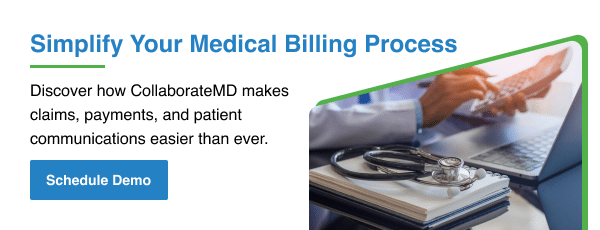Technology has become an essential tool in the healthcare industry. Medical records are now digital. Software supports practice management and revenue cycle management. It also helps with diagnosis and treatments. With the emergence of artificial intelligence (AI), new use cases are available. One of the most effective is artificial intelligence medical billing.
If you’re considering integrating AI into medical billing, keep reading to understand how it works. Explore the benefits and challenges associated with the technology. Then review best practices in implementing AI into medical billing.
Understanding Artificial Intelligence for Medical Billing
Artificial intelligence enables computers and machines to replicate human intelligence and problem-solving capabilities. It’s become part of everyone’s everyday life when interacting with technology.
Different types of AI can support human tasks, including:
- Generative AI: AI generates new text, images, video, or music based on inputs.
- Conversational AI: AI bots can understand a person’s text or voice and respond with human-like responses.
There are also “branches” of AI that enable specific functionality, such as:
- Machine learning: This subset of AI and computer science focuses on using data and algorithms to identify patterns and gain insights.
- Neural network: This process incorporates cognitive science into machines so they can execute tasks via algorithms.
- Natural language processing (NLP): This AI component allows computer programs to understand human language, spoken or written.
- Deep learning: Machines process and analyze data to identify a single acceptable output.
- Cognitive computing: This AI works with humans to initiate and enhance interactions to complete complex tasks.
- Computer vision: This AI subfield enables computers to analyze and interpret visual inputs.
AI encompasses a large ecosystem of capabilities. As a result, it has many use cases.
General applications of AI include:
- Automating workflows within software
- Aggregating and analyzing massive amounts of data
- Assuming repetitive tasks for human operators
- Using it as a recommendation engine
- Digital assistants and chatbots
- Content creation
- Data visualization
AI’s Role in Healthcare
From these general applications, healthcare has many opportunities to leverage AI. The adoption of AI in the medical field is growing. For example, 41% of healthcare leaders said it was fully functional. According to an American Medical Association (AMA) study, most physicians support it.
How are they using it? The use cases are broad and include:
- Disease diagnosis through the analysis of data and pattern identification
- Treatment development based on the examination of patient data sets
- Predicting side effects and finding ideal candidates in drug discovery
- Automation of workflows in EHR systems and medical billing software
- Robotic surgery
- Streamlining the coding and claims process
AI drives innovation in the healthcare industry with all these varied applications.
FROM ONE OF OUR PARTNERS
Top Revolutionary Leaders in Healthcare AI to Watch
Applying AI to Medical Billing
Artificial intelligence medical billing has become a critical use case for this technology. By integrating AI into this part of the revenue cycle, practices can automate parts of this workflow. AI powers the process, boosting efficiency and accuracy.
Errors in claims are a challenge for any process. Human error is often the culprit, either by mistakes or not having access to up-to-date codes. Claim denials cause delays in reimbursement, and they are rising. An analysis by KFF found that insurance denial rates could be as high as 49%.
With AI medical billing, you can prevent these costly denials. Another application in medical billing is data analytics. AI delivers valuable information to spot trends in medical billing. It can be useful for forecasting revenue.

Benefits of Using Artificial Intelligence for Medical Billing
What can your practice gain from AI medical billing? You can expect these benefits:
AI accelerates the medical billing process and is scalable for practices as they grow.
AI works nonstop in the medical billing cycle, ensuring superbills are ready faster. When patient intake increases, AI has unlimited capacity to keep up. As a result, you won’t need to hire more medical billers.
Using AI in medical billing improves accuracy and decreases denials.
Clean, accurate claims are the outcome of AI in the system. It applies the appropriate codes to help you avoid under-coding.
As codes change regularly, AI medical billing tools must have access to up-to-date information. This ensures that documentation is compliant.
Accuracy improvements are the result of machine learning algorithms. These algorithms continue to learn as they code, becoming more precise.
Immediately finding mistakes means you’ll deal with fewer denials, boosting cash flow.
AI can predict cash flow to improve forecasting.
With an AI engine in your medical billing software, deep analysis of data can occur. With this, you glean insights into cash flow. AI also has a role in payment process automation. It’s critical to improving the accuracy of forecasting.
FROM ONE OF OUR PARTNERS
Looking Ahead: The Future of Healthcare Payment Technology
Medical staff can focus on more strategic work and increase productivity.
Manual coding is time-consuming, keeping workers busy. When AI becomes your medical coding assistant, team members can work on more important activities. Giving this time back lets them refocus on other things. They can be more engaged with patients and analyze practice revenue.
AI lowers your operational costs and fills talent gaps.
Investing in AI medical billing is cost-effective for the value it brings. You’ll need fewer manual coders. Finding experienced coders isn’t easy. In fact, 34% of medical groups said it was the most difficult position to hire for.
AI saves time and resources by reducing the strains of auditing as well.
AI provides a charge capture solution.
Charge capture must be accurate to ensure claims get the proper coding. It’s a crucial step in the revenue cycle. AI helps with these tasks. It provides insight into practice billing, preventing missed charges, and improving charge predictions.
RELATED ARTICLE
What’s the Role of Artificial Intelligence in Charge Capture?
Challenges of Using Artificial Intelligence for Medical Billing
As with any technology, challenges arise in applying AI to medical billing. These are some of the most common:
Coding systems are complex.
There are two main sets of codes—ICD-10 and CPT. They also change annually. For AI to perform precise coding, its access to data must always be current.
Legacy platforms don’t play well with AI.
Many healthcare practices still use older systems that don’t have modern architecture. It creates interoperability and data access issues.
Cybersecurity concerns heighten.
Introducing new technology that uses protected health information (PHI) creates new cyber threats. It’s valuable data to hackers, so you must ensure the tools you use are cyber-secure.
Compliance requirements apply to AI’s use of PHI.
Medical billing software accesses PHI. As a result, the technology is subject to HIPAA compliance rules. The solution you select must be HIPAA compliant.
Different data formats create sync issues.
Sometimes, the data output by other systems in your practice has a unique format. It makes information harder to sync, so standardization needs to be considered.
Billing decisions won’t always be exact.
The AI models supporting coding aren’t infallible. They do become better by learning, but they still lack human reasoning.
Resistance to change may be an obstacle.
Transforming your practice’s technology may receive pushback from some staff. Explaining how it works and the value it brings to them can ease these concerns.

Best Practices for Using Artificial Intelligence for Medical Billing
Based on the benefits and challenges of AI in medical billing, you’ll want to heed these best practices:
Implement AI throughout the claims workflow.
For AI to be practical and provide value, you should integrate it throughout the entire claims process. When you do so, you gain accuracy and efficiency. The technology supports the workflow by:
- Parsing information from patients at registration (e.g., insurance information)
- Capturing charge data
- Automating and tracking claims submissions
- Finding and correcting errors
- Helping with denials management
Audit your AI-driven processes.
AI provides you with a powerful tool, but it still needs human oversight. After you install it, you should perform regular audits. Doing so ensures accuracy, compliance, and performance.
Ensure AI automation is effective.
Automation via AI technology removes burdensome, manual work from workers. However, you should still be guiding it. Work with your software provider to understand what the capabilities are. Outline how those align with your existing processes.
AI is the key to predictive analytics.
Predictive analytics is the practice of examining data to answer questions, find trends, and gain insights. These are crucial for determining revenue forecasting and enhancing patient outcomes.
AI tools crunch your data and create actionable insights. You’ll gain transparency around the claims submission and revenue cycle. This use case demonstrates a strategic application versus just a tactical one. Be sure you have this capability.
These detailed reports can also be useful in identifying patterns within patient data. It could lead to improvements in patient care and treatment plans.
AI discovers the root causes of claims issues.
Many factors are responsible for claims issues. AI helps you get more specific information related to flaws in procedures, human error, and more.
Understanding these patterns invigorates the entire revenue cycle and reduces rejections. If the root cause is systemic, you now have the intelligence to fix it.
How You Can Start Using Artificial Intelligence for Medical Billing Right Now
Implement artificial intelligence medical billing and begin benefiting from the technology. Here’s how to get started:
- Assess your current billing structure. Then, find the gaps by documenting your billing and coding workflow.
- Research and demo different AI medical billing tools.
- Consider all compliance and regulatory requirements when evaluating software options.
- Determine if any legacy systems will create AI integration issues; if so, decide if you can replace them.





